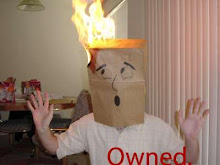Tuesday, November 6, 2007
Eternal Sunshine of the Spotless Mind
Wednesday, October 31, 2007
His Girl Friday
I like how they make the main characters different and you feel sad for Bruce. Walter seems like a person who lies and kind of cheats the system by using Loui and you can see he's the type of person who play's with people's mind plus really confident in himself. Then there's Hildy who's loyal and honest, she also has control and has leader attributes in her relationship(s). Then finally Bruce who also loyal, honest, and has never lied as his mother said, which is what a house wife would want but Hildy doesn't fit with him as she finds out at the end because he's too slow, the way he acts, thinks, and talks. He also gets into bad situations, due to Walter in the movie, and Hildy always comes and saves him. I really think that the fast paced talking really sped up and made you want to watch because there's always action going on. If you try to think this movie without fast-paced talking, it'll be a pretty boring movie.
Monday, October 1, 2007
Journal #2 Film Review
The basics
o What is the title of the film?
Plains, Trains and Automobiles
o Who directed the film?
John Hughes
o Who are the main actors in the film?
Steve Martin and John Candy
o Who wrote the screenplay?
John Hughes
o Who was responsible for photography?
Don Peterman
o Who produced the film?
John Hughes
o Who wrote/played/sang the music?
Westworld performed the song
o If you plan to mention any technical aspects of the film, you should find out the name of the people responsible for those aspects (such as editor, costume designer, and so forth).
| Paul H Lopez | Costumes - key costumer |
| Frank Griffin | Makeup |
| April Ferry | Costume Designer |
| Ben Nye Jr | Makeup - makeup design |
| Silvio Scarano | Costumes - key costumer |
| Dennis Schoonderwoerd | Costumes - costumer |
Description/summary of the film
o What other movies is this movie like?
o Who are the main characters?
Neal and Del
o What is the setting of the film?
New York, Chicago, Kansas
o What is the main situation or source of conflict?
Neal is trying to get home 2 days before thanksgiving to his family, only to find out that all flights have been cancelled.
o Summarize the plot (without the ending!) in no more than five sentences. REMEMBER: Your reader wants to know enough about the movie to make decision about going to the movie, but not so much that there’s no need to go.
Neil page is the main actor along with Del Griffin who come in conflict in the beginning while Neil was trying to get to the airport, coming from a meeting. During traffic Del "steals" his cab, and they meet up at the airport, and coincidently, on the plane sitting next to each other. They end up becoming friends and go through conflicts that stop them from getting to their destination.
Your analysis of the film
A. Literary aspects
o Characterize the plot/story of the movie. Is it involving, convoluted, simplistic, realistic, unbelievable, highly unlikely, well-structured, unresolved? (Add to this list if you need to).
This movie would be realistic because Neil is trying to get home to have thanksgiving with his family and anything is possible out in the world. Canceling flights is a common problem to happen. He also gets involved with Del who is obnoxious who doesn't know when people hate him or if they think he's
o How would you characterize the dialogue? Do people talk this way in real life? (Or if realism was not a goal of the movie, was the dialogue amusing, poetic, or moving?)
I would say that they do talk like this in real life, which is why it is rated R. A lot of people nowadays tend to swear, and this movie makes Neil frustrated so he swears a lot and takes his anger on items or props in the movie.
o What themes do you see in the movie?
o Do you notice any symbols that recur in the movie?
B. Dramatic aspects
o Describe the acting. Did you believe that the actors were the characters?
Yes, Neil was a sophisticated person, but at the same time was a normal person. He seems like the every day normal person, he shows frusteration during the conflicts he goes through and he just wants to spend time with his family. Del on the other hand was a unique character and John Candy played his role pretty good because he was very obnoxious and thinks about other people before him.
o Describe the sets, costumes, makeup and lighting if these elements of the film’s design are significant.
C. Cinematic aspects
o What did you notice about the film’s cinematography? Did the director employ a lot of camera movements? Close-ups? High or low angles? Distorted lenses? Special visual effects?
There were a lot of close up and far away shots to show facial expressions, mostly frustration and also far away shots when he goes rampaging.
o What did you notice about the film’s editing? Where there quick cuts? Lengthy shots? Other transitions?
o What did you notice about the film’s sound effects and music? What did they add to the overall effect of the film?
The music added more action into the film, especially when they were running and chasing each other.
Monday, September 17, 2007
Critique The Critic (Roeper)

As many of you probably might know Roger Ebert from the show “Ebert and Roeper” who talks about recent movies and critique it. I am doing my Critique on Ebert from the movie “The Usual Suspects” director Bryan Singer. I watched a little bit of Ebert and Roeper but I don’t think that show really helps me about choosing which movies I want to see because he does have different opinions than mine. I don’t read a lot of reviews for movies, and Ebert was the only famous name that I know so I chose him.
Once again, my comprehension began to slip, and finally I wrote down: "To the degree that I do understand, I don't care." It was, however, somewhat reassuring at the end of the movie to discover that I had, after all, understood everything I was intended to understand. It was just that there was less to understand than the movie at first suggests.
Ebert talks about how he doesn’t understand the plot and says he’s seen too many movies and that may be his problem to not understanding. I thought this was a dumb thing to say because the whole point of the movie was for people to put the pieces of clues together not just give up.
The movie begins "last night" in San Pedro, Calif., where an enormous explosion rips apart a ship. Who set the explosion? Why? A cop named Kujan (Chazz Palminteri) wants to know. He has one witness to question: a shifty-eyed, club-footed criminal named Verbal, played by Kevin Spacey with the wounded innocence of a kid who ate all the cookies. Kujan and Verbal are closeted much of the time in the cop's cluttered office, where Verbal lives up to his name by telling a story so complicated that I finally gave up trying to keep track of it, and just filed further information under "More Complications."
This movie makes you think a lot and has a lot of mystery’s. When the movie starts, there’s already action going on and you just jumped in the middle of it. To be honest I didn’t really pay attention in the beginning. It is true when he says that there was less to understand than what the movie first suggested. You think that the director might give you a hint about something big that’s going to happened and it did feel like it at the beginning with the big explosion in the beginning and why we were at that scene at the moment.
The interrogation between the cop and the suspect falls into a monotonous pattern: friendliness, testiness, hostility, a big blow-up, threats, reconciliations and then full circle again. We hear amazing stories about Soze (one survivor of the boat explosion, with burns over most of his body, drifts in and out of a coma but can talk of no one else). As Verbal talks, we see what he describes, and his story takes on an objective quality in our minds - we forget we're only getting his version.
Throughout the movie I didn’t even notice the pattern but now I do. Also about how Verbal only gives his version of the story because he was the only one alive. If I knew about these clues I would have been more aware of the storyline. But I saw this movie when I was just bored one day and a friend showed me it so I wasn’t expecting to have a real in-depth thought about it until the movie ended, which made me want to watch it again and actually put the mystery together and watch little detailed clues. From the very beginning of the movie the mystery starts right away. Most of the movie takes place in an office and you might find it to be boring after a while. When I first saw this movie I did get lost during the movie 90% of the time. Ebert makes himself look dumb by saying that he gave up trying to listen to Verbal’s story and putting in the “More Complications” list. The audience is like Kujan who wants to know why there was a ship blown up at the beginning of the movie, and to put clues together. That’s how I felt when I first saw it.
To the degree that you will want to see this movie, it will be because of the surprise, and so I will say no more, except to say that the "solution," when it comes, solves little - unless there is really little to solve, which is also a possibility.
Very true, I had to put out the clues and mystery’s that Verbal told us and I had to think of the story. It is true that maybe there was little to solve, it was just that you wouldn’t of expected what the result was at the end. Throughout the movie you had to think a lot and I like those kind of movies now that I have seen The Usual Suspects. A mysterious movie that you are trying to solve and watch at the same time while they give you every little clue.
The movie turned out the be a really great movie and I suggest this to be a must watch movie. What makes this movie interesting is that it is told from the story of Verbal only and you see these story take place while Verbal narrates it. The way Ebert put it though, I felt that Ebert shouldn’t even be critiquing movies and publishing those anymore.

